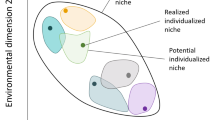Abstract
Outlined here is an updated review of the long-standing ‘kin selection vs group selection’ debate. Group selection is a highly contentious concept, scientifically and philosophically. In 2012, Dawkins’ attack against Wilson’s latest book about eusociality concentrated all the attention on group selection and its mutual exclusivity with respect to inclusive fitness theory. Both opponents seem to be wrong, facing the general consensus in the field, which favours a pluralistic approach. Historically, despite some misunderstandings in current literature, such a perspective is clearly rooted in Darwin’s writings, which suggested a plurality of levels of selection and a general view that we propose to call ‘imperfect selfishness’. Today, the mathematically updated hypothesis of group selection has little to do with earlier versions of ‘group selection’. It does not imply ontologically unmanageable notions of ‘groups’. We propose here population structure as the main criterion of compatibility between kin selection and group selection. The latter is now evidently a pattern among others within a more general ‘multilevel selection’ theory. Different explanations and patterns are not mutually exclusive. Such a Darwinian pluralism is not a piece of the past, but a path into the future. A challenge in philosophy of biology will be to figure out the logical structure of this emerging pluralistic theory of evolution in such contentious debates.
Similar content being viewed by others
References
Abbott P, Abe J, Alcock J, et al. 2010 Inclusive fitness theory and eusociality. Nature 471 E1–E4 (Nowak et al. reply: E9–E10)
Boehm C 1999 Hierarchy in the forest: The evolution of egalitarian behavior (Cambridge, MA: Harvard University Press)
Borrello ME 2010 Evolutionary restraints. The contentious history of group selection (Chicago: The University of Chicago Press)
Bowles S 2008 Being human. Conflict: altruism’s midwife. Nature 456 326–327
Dawkins R 2012 The descent of Edward Wilson. Prospect 24 May 2012
Eldredge N 1999 The pattern of evolution (New York: WH Freeman and Co)
Gilpin ME 1975 The theory of group selection in predator-prey communities (Princeton, NJ: Princeton University Press)
Goodnight CJ and Stevens L 1997 Experimental studies of group selection: What do they tell us about group selection in nature? Am. Nat. 150 S59–S79
Gould SJ 2002. The structure of evolutionary theory (Cambridge, MA: Harvard University Press)
Harman O 2010 The price of altruism: George Price and the search for the origins of kindness (New York: Norton)
Kaushik S, Katoch B and Nanjundiah V 2006 Social behaviour in genetically heterogeneous groups of Dictyostelium giganteum. Behav. Ecol. Sociobiol. 59 521–530
Nowak MA 2006 Five rules for the evolution of cooperation. Science 314 1560–1563
Nowak MA with R Highfield 2011 SuperCooperators. Altruism, evolution, and why we need each other to succeed (New York: Free Press)
Nowak MA, Tarnita CE and Wilson EO 2010 The evolution of eusociality. Nature 466 1057–1062
Okasha S 2006 Evolution and the levels of selection (New York: Oxford University Press)
Pagel M 2012 Wired for culture. The natural history of human cooperation (New York: Allen Lane)
Pievani T 2011 Born to cooperate? Altruism as exaptation, and the evolution of human sociality; in: Origins of cooperation and altruism (eds) RW Sussman and CR Cloninger (New York: Springer) pp 41–61
Pievani T 2012 An evolving research programme: The structure of evolutionary theory from a Lakatosian perspective; in The theory of evolution and its impact (ed) A Fasolo (New York: Springer-Verlag) 211–228
Richerson PJ and Boyd R 2005 Not by genes alone: How culture transformed human evolution (Chicago: The University of Chicago Press)
Smith J, Van Dyken JD and Zee PC 2010 A generalization of Hamilton’s rule for the evolution of microbial cooperation. Science 328 1700–1703
Sober E 2010 Did Darwin write the origin backwards? Philosophical essays on Darwin’s theory (Amherst, NY: Prometheus)
Tarnita CE, Antal T, Ohtsuki H and Nowak MA 2009 Evolutionary dynamics in set structured populations. PNAS 106 8601–8604
Wilson DS 1975 A theory of group selection. PNAS 72 143–146
Wilson DS 1987 Altruism in Mendellian populations derived from kin groups: the haystack model revisited. Evolution 41 1059–1070
Wilson DS 2012 Richard Dawkins, Edward O Wilson and the consensus of the many. This view of life 29 May 2012
Wilson DS and Wilson EO 2007 Rethinking the theoretical foundation of sociobiology. Quart. Rev. Biol. 82 327–348
Wilson EO 2012 The social conquest of earth (New York: Norton)
Author information
Authors and Affiliations
Corresponding author
Additional information
[Pievani T 2014 Individuals and groups in evolution: Darwinian pluralism and the multilevel selection debate. J. Biosci. 39 1–7] DOI 10.1007/s12038-013-9345-4
Rights and permissions
About this article
Cite this article
Pievani, T. Individuals and groups in evolution: Darwinian pluralism and the multilevel selection debate. J Biosci 39, 319–325 (2014). https://doi.org/10.1007/s12038-013-9345-4
Published:
Issue Date:
DOI: https://doi.org/10.1007/s12038-013-9345-4



